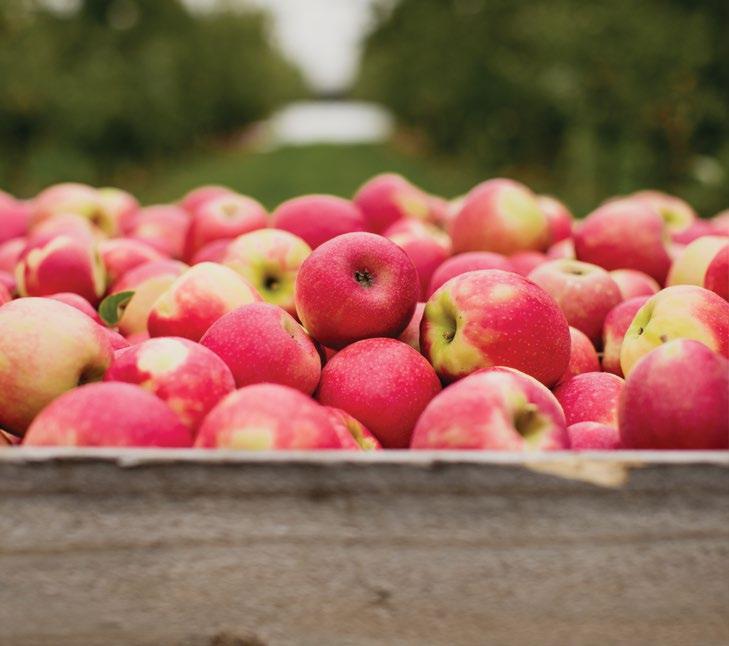
17 minute read
POMEWEST
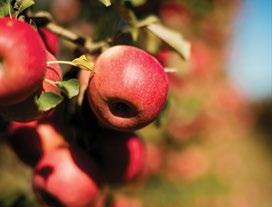
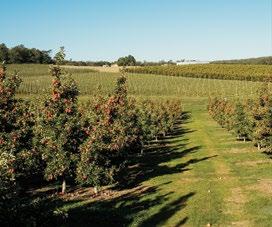
Advertisement
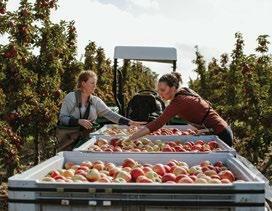
update pome

contacts
Committee and Officers
Jason Jarvis, Chair e: twinpack@bigpond.com Mario Casotti e: mario@casottigroup.com Wayne Ghilarducci e: strathspey@modnet.com.au Jason Jarvis e: twinpack@bigpond.com Harvey Giblett e: harvey.giblett@newtonorchards.com.au Sam Licciardello e: sam@orchard1sixty.com.au Mark Scott e: markpscott@bigpond.com Susie Murphy White, Project Manager e: susan.murphy-white@dpird.wa.gov.au Nardia Stacy, Executive Manager e: nardia@pomewest.net.au
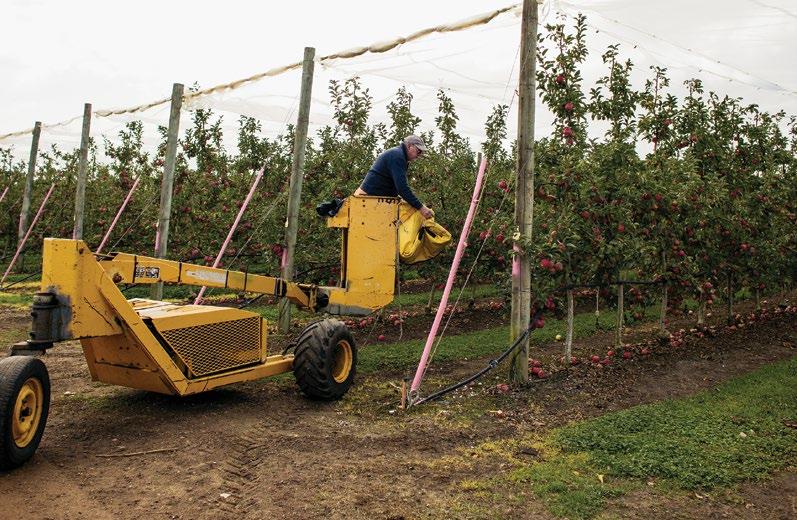
Budgeted income 2021–22
Project
General Account Budget (including FFS, interest Project Grant Funding APAL, Hort Innovation and DPIRD) Biosecurity Account Budget (FFS and interest) 482,780
61,245
Budgeted expenditure general account for 2021–22
Project $
Project Manager including operating expenses — Susie Murphy White 96,000
Quality Testing Project — Maturity and Retail 36,000
Building Horticulture Business Capacity Program
20,000 Medfly Surveillance Trapping Network Kim James 12,500 Systems Approach Low Pest prevalence for Market Access 40,000 Promotion & Publicity Local Project — Fresh Finesse including events with Buy West Eat Best 37,500 Annual Meetings and Communication including publications 15,000 Industry Sponsorships and Association Memberships 6,000 Study Tour COVID-19 permitting 20,000 Producing Sustainable Crop Load Project — DPIRD 30,000 Platform Project 40,000 Administration including salary and office costs 192,000 APC charge @10% of FFS income 42,000
Project
Codling Moth (DPIRD) APC charge @10% of FFS income
Total
35,500 6,000
41,500
APC fee-for-service charge
POME FRUIT EFFECTIVE FROM 1 JANUARY 2015
Type of fruit
Fresh fruit — apples, pears, Nashi, other Processing fruit Biosecurity FFS for fresh fruit Biosecurity FFS for processing fruit
$/kg
0.015 0.005 0.002 0.001
Season update
BY NARDIA STACY EXECUTIVE MANAGER, POMEWEST
Happy 2022 from our team to our growers and stakeholders.
It’s harvest time, and again, the pandemic continues to test us. Nobody knows how, or when to predict the end of the COVID-19 assault, but what we do know is that scarcity in our labour force is already in play, and the next phase in balancing fully viable operations with the threat of infections, and duty of care to the wider community will be challenging for all WA businesses.
As a disclaimer — it is difficult to report on and predict the future.
The current situation may alter after writing this update, which is indicative of the rapid ever changing COVID management environment the world still faces. Whilst we hope for a quickfix to ongoing disruptions and added challenges, this article may serve as record in history of the general feeling of the industry now. Something to be grateful for is that WA, to date, has been well isolated and well protected from the full impact of lockdowns with the economy remaining largely intact. However, most indicators point to the fact that this may soon change for all of us. It is the general view of the current State Government to manage the full impact of this new wave of Omicron by implement a high vaccination status and manage the spread, not the ‘let it rip.’ strategy adopted by other countries and states. There is a transition plan to opening our borders, which defines new protocols formatted from learnings from the East Coast for our critical workers in high caseload environments.
It is good to know that the agricultural industry has been classified as a critical service of the State. We are more fortunate than most as we are able to voice our concerns, and they can be heard at the highest level. Pomewest will continue its role in keeping you up to date of all the latest developments for the Agricultural Industry and to let you know you are not alone in many your concerns; these are widespread in the sector. The best defence we can take as an industry is being well informed, prepared and measured in the handling and working within the confines of directions.
In doing so, our 2022 harvest can be completed, without too many casualties. In the meantime, please continue to keep us aware of any issues you need us to clarify or consider on any industry matters.
Season so far…
The 2021–22 season started with a very wet and cold winter, followed by wet and mild spring in 2021. Most growing regions received below average winter chill portions and above average rainfall in all locations. As such water supply was at capacity with dams overflowing by the end of spring. Good thing too, as the heatwave during the Christmas and New Year week saw average temperatures rise above 38ºC for 5 days (39ºC–41ºC) in Donnybrook through to the Perth Hills. Slightly cooler in Manjimup and Pemberton (35ºC–38ºC). Then again, a five-day heatwave mid-January. The winter supply was used to manage the impact of several summer heat waves. Some sun damage in fruit has occurred as a result from the heat. However, the increased amount of permanent netting structures completed this year has protected most of the fruit. Preventative protectant sprays started before the heatwave and some blocks still to be thinned post-Christmas were also beneficial strategies for some growers.
Pomewest is the pome subcommittee of the pome, citrus and stone fruit Producers’ Committee of the Agricultural Produce Commission in Western Australia
OF APPRECIATION
AWARDED TO
It was pleasing to see that the federal horticulture netting infrastructure scheme for pome in this State, was fully subscribed by December.

In recognition for consistently passing the minimum maturity standards for Royal Gala, Granny Smith and Pink LadyTM apples in the 2021 season. On behalf of the WA Pome Industry, we thank you for embracing this initiative and for your commitment in making WA apples great apples and the No. 1 choice for quality. Keep up the great work in 2022.
Jason Jarvis
Chair
An extremely successful result. The funding program has over $1.6M of net constructed in WA and the netting contractors are extremely busy as a result — so much so that the price of netting has gone up, in fact it has doubled due to supply and demand created by the scheme. Although an off-crop year, pleasingly the signs are indicating that is not that much less affected than the previous season. The crop presented heavy with a good amount of hand thinning required. Good quality apples, very clean crops, with little pest and disease issues apart from weevils which started to appear in late January. Labour supply is still light, with most using Pacific Islanders and topping up with locals if needed. Smaller orchards which do not have the set up for seasonal labour have sourced longer-term locals and are working with a smaller crew.
Just recently a labour hire group has been able to supply a large group of 18 workers to finish off the thinning within a week in a couple of orchards. Some sharing of workers between other industries and neighbouring farms is occurring, which is pleasing to note. The new season also challenges our Maturity Standards program managing the early fruit. We are committed to continue holding growers accountable for their part in providing good quality tasting fruit into the market and providing the best start to the season. Many growers would have received certificates for excellent testing results for last season, keep up the good work.
We have included in this edition our notice to industry and the supply chain to advise the start of the 2022 quality program to remind everyone of our commitment to providing quality produce to our consumers. The annual APC Project call process has commenced, and we remind everyone that the project selection will be influenced by the strategic plan from 2021–2025 key objectives which align with tactics to improve productivity and profitability for our growers. The focus remains to be the improvement of Class 1 pack outs for both apples and pears, increasing household spending trends, and building exports. We have prioritised some tactics and will be looking at developing and investing in projects that will assist us to deliver these outcomes.
Events and meetings
We are keen to support various events. However, many are under a cloud with the ever-present threat of COVID. So far, our post-harvest seminar and the summer/autumn future orchard walk have been postponed. It is too risky to bring industry together prior to harvest in this ever-changing environment. We are still waiting to hear about the Cider Conference in the Perth Hills in late April. Whatever the outcome, we will endeavour to support growers with the promotion of product wherever possible, even if our presence at events cannot take place. Meetings, including Committee meetings are predicted to be online in the foreseeable future until we understand the impact of spread of this new variant.
This edition
We review the November 2021 Future Orchard Walk held at Ladycroft Orchards in Manjimup. Can I take this opportunity to thank to Bec Whittaker and her staff for hosting such a great day. It was nice to see cross-industry representation from Citrus and Stone fruit industry officers at the event. We hope to engage in more cross-industry engagement in 2022 and support other industry field days. We also include an opinion piece on how some of the grower and packing businesses are managing the Omicron outbreak in the Eastern States where the border restrictions have been relaxed. Some excellent practical advice has been shared with us to assist us with the impact of greater infections of the virus in the community. I would like finish by inviting any grower or stakeholder to contact me if you need any assistance with any industry matters. Both Susie and I are committed to our service roles for the pome industry and always welcome your engagement and feedback. I wish everyone success with the upcoming season and hope to see you on the other side with good prices and marketing success for the duration of 2022.
MORE INFORMATION
Contact Nardia Stacy, Executive Manager, 0411 138 103 or nardia@pomewest.net.au
OPINION PIECE ON THE PRACTICAL EXPERIENCES FROM THE EAST COAST APPLE AND PEAR GROWERS ABOUT LIVING WITH COVID-19.
Omicron Overcoming
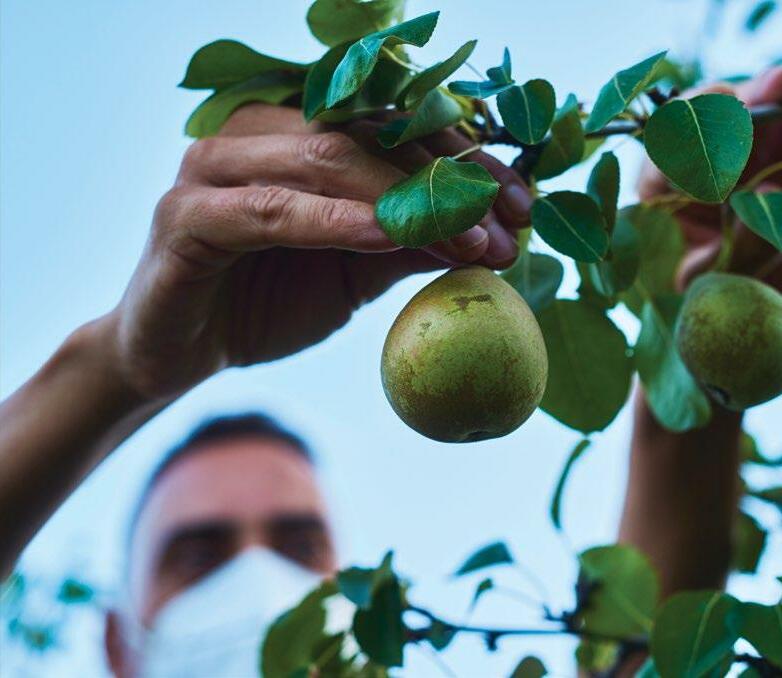
BY NARDIA STACY EXECUTIVE MANAGER, POMEWEST
As the WA Pome industry will potentially be facing a battle with harvest and Omicron simultaneously, it is timely to understand how the East Coast of Australia have managed the situation so far.
Pomewest have been privileged to gather some powerful insights from leading growers in the East on the impact of Omicron so far and the risk management practices that have proved to be effective. The West Australian State Government has now acknowledged the new management strategy for the State is to not stop but slow the spread of the Omicron variant in the WA community. This variant is tipped to spread quickly.
DISCLAIMER: THIS ARTICLE REPRESENTS THE VIEWS AND INFORMATION CURRENT AT THE TIME OF WRITING. The following is a summary of some of the top strategies that have helped growers prepare, with ideas and examples of how you can take some control to manage your business.
Your household
The focus on pack sheds and orchards seems to be the priority, however, if someone in your own household contracts the virus you must plan on how you manage isolation without the whole family household being in quarantine. Develop your own workable family risk management plan to keep yourself safe from infection, consider planning segregation zoning measures, understand the impact of risk of attending highly-transmissible events, traveling to regions etc.
Team meets
Have daily team discussions to keep keen awareness and avoid complacency to maintain workable compliance for staff and workers. Increase awareness of cleaning and hygiene practices including mask wearing, hand washing, policy on travelling in cars or being in close proximity and social distancing.
Outdoor complacency
Do not allow people working outdoors to become complacent simply because they are working outdoors. Some growers in the East are having bigger problems in their orchards than in pack houses where they can have >150 people under one roof at any given time.
f SOME growers in the East are having bigger problems in their orchards than in pack houses.
f DO not allow people working outdoors to become complacent simply because they are working outdoors. This is largely to do with seasonal worker cohorts living together in bulk accommodation settings where the virus is spreading quickly, and then spreading it to other orchard staff who are lax with PPE, social distancing, sanitising etc. Many of said employees have lulled themselves into a false sense of security that the virus is only an “indoor” problem, but they have been underestimating the amount of close interaction they have with their co-workers on a day-to-day basis. normally require during harvest (granted not easy in current environment, but you’ll need multiple contingencies). You could have the most robust COVIDSafe-Plan of all time in the orchard and pack house, but COVID will still affect your business in that you have no control over what people do in their own time. Keep your communications open and regular with staff.
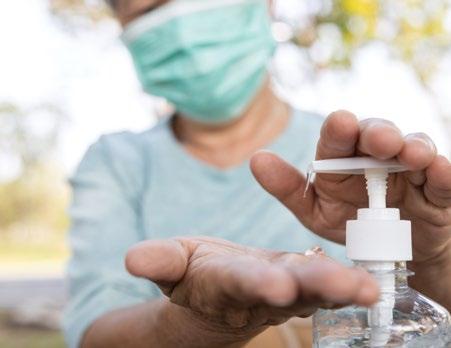
Develop your on-farm visitor policy
Out of work activities
Discuss ‘out of work’ activities and compliance of check-ins, masks, travelling in cars and social distancing to avoid bring the virus to work.
Assess the risk of transport spread of the virus — this may include limiting entry to site and making sure you record visitor details, interaction or any contact. For example, look to find paperless transactions if possible or decide not to allow any visitors at all. Increase signage around your premises to make Manage and potentially restrict sure you are managing visitors for any travel between regions — contact tracing investigation. encourage application of Manage duties ‘Good2Go’ passes. Yes, you may prevent it from spreading in your workplace, but your workers can still contract COVID away from work, or they will be close contacts, and you will need to replace them temporarily. Consider staff segregation, split work duties, lunch and tea breaks to limit social interaction between staff, if possible. Develop rosters for keeping one machine or one task for one staff operator to manage any contamination. Encourage ongoing vaccinations for workers and employees.
Plan for labour shortages
Expect, plan and prepare to have labour shortages. Try to have access to at least 1.5 times the headcount you would
Rapid Antigen Testing
If possible, implement regular Rapid Antigen Testing (RAT) if available. This is a practical way to manage infections, which can be expensive to implement, but ultimately cost-effective if you are facing the risk of closure if multiple staff are required to isolate. We know that temperature tests are of limited value because they can’t determine COVID infection — that is high-temperature readings do not always mean you have COVID-19.
Vaccinations
Encourage ongoing vaccinations for workers and employees by giving time way from site without taking sick or annual leave.
MORE INFORMATION
Contact Nardia Stacy, Executive Manager, 0411 138 103 or nardia@pomewest.net.au.
Technology flying high at Future Orchards® Walk
BY SUSIE MURPHY WHITE PROJECT MANAGER, POMEWEST
Ladycroft orchard in Manjimup was the host for APAL’s Spring Future Orchards® Orchard Walk, showcasing a range of strategies, innovations and technology options that may assist with decision-making in the orchard.
The now Pink Lady® royalty funded Future Orchards® program is offering growers a wider range of guest speakers from a local pool of experts, as COVID keeps us operating more locally in Western Australia.
CSBP’s AgTech services Agronomists Andreas Neuhaus and Ashley Juers were the guest speakers for the day, presenting about the value of soil mapping and how it can be used to make decisions for soil and plant health.
The presentation included a demonstration of the Decipher Ag mapping platform which can be used for record-keeping of soil test data, determining management zones, sampling points, and viewing peak biomass.
We joined the virtual National Orchard Talk in the Ladycroft shed, where Craig Hornblow (AgFirst) and Nic Finger (Fruit Help) discussed how to achieve fruit quality outcomes using the data collected during the season. Crop estimates, fruit size and hand thinning numbers can be useful to make more informed decisions for orchard management and options available (tools, technology) for collecting data. As always, the presentations can be found on the Future Orchards library and on the APAL YouTube channel.

The surprise demonstration for growers was by Christian Sieber from Omnidrones, demonstrating the XAG agriculture solutions. This included their automated custom-built multipurpose tracked vehicle used to transport equipment around the orchard. Then the Rover, unmanned ground vehicle traversed down the rows and spraying water over the apple trees. This vehicle had only just been unboxed and was very new to their fleet. The demonstration finished with the drone spraying system which was designed for aerial application to seed mine sites and apply plant protection products for agriculture. All were controlled by the operator’s mobile
f OMNIDRONES Rover, unmanned ground vehicle traversing down the rows.
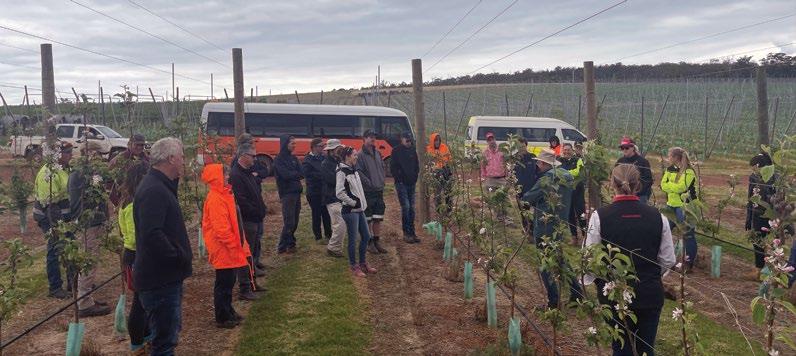
f SOIL Your Undies Challenge, wall of dirty undies.
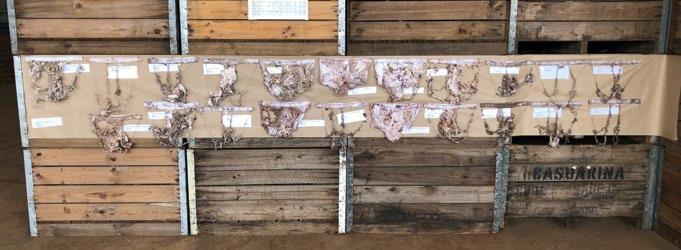
phone, with the capability of using either aerial photography or the satellite soil mapping that had been done in the DecipherAg® program that we had seen demonstrated earlier by Andreas and Ashley. Growers were most impressed with the demonstration and keen to see how it could be applied in apple and pear orchards.
Then the undies came out from the Soil Your Undies Challenge; the decomposed undies were pinned up to reveal how decomposition had occurred during the 10-week challenge.
Some looked like thongs with all the cotton eaten away! No firm conclusions were made from the trial, but in any case, the measurement and understanding of soil health and its benefits to the tree made as an interesting discussion within the group. The presentations were followed by a tour of Ladycroft orchard to explore the new plantings and PIPS3 demonstration site. Growers were able to see the new planting of 27,000 Cosmic Crisp® apples on a steel framed V trellis, which was very impressive. The progress of the twin leader Bravo™ planting was discussed with Marcel Veens. The PIPS3 soil health demonstration site was viewed by all. This site includes different inter row and under tree treatments monitoring insects and soil properties. Ladycroft Orchard hosted an extremely successful future orchard event, with many local growers from Kirup — Pemberton attending the day. Thank you to Bec, Shaun and all the orchard team at Ladycroft for providing us with a great venue and for opening up their orchard to show case the trials and look at the new infrastructure and their exciting young plantings.
MORE INFORMATION
Contact Susie Murphy White, Project Manager — Pomewest, on 0429 413 420 or susan.murphy-white@dpird.wa.gov.au. f BEC Whittaker, Ladycroft Orchard Manager, talking about training of Cosmic Crisp® apples onto a V Trellis.
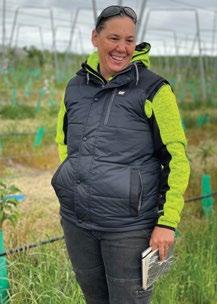
POMEWEST IS THE POME SUBCOMMITTEE OF THE POME, CITRUS, AND STONE FRUIT PRODUCERS’ COMMITTEE OF THE AGRICULTURAL PRODUCE COMMISSION IN WESTERN AUSTRALIA
Apple Industry Notice
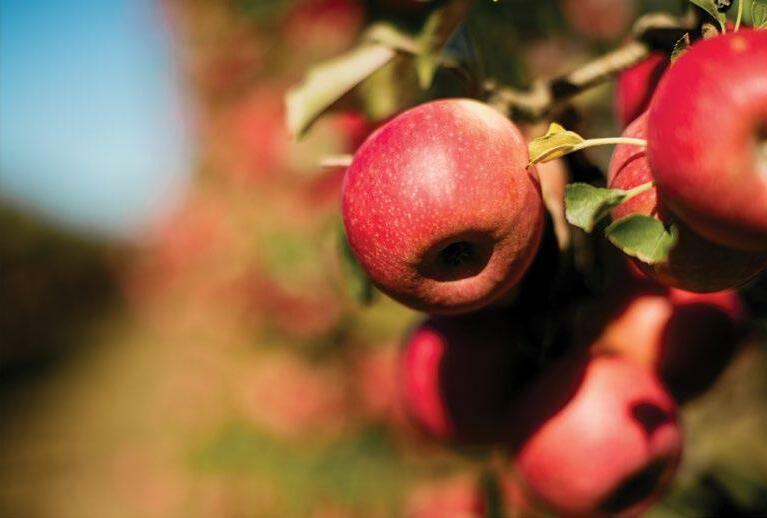
TO: APPLE PRODUCERS, WHOLESALERS, STORE MANAGERS, PRODUCE BUYERS, FRESH PRODUCE MANAGERS
BY NARDIA STACY EXECUTIVE MANAGER, POMEWEST
2022 WA Quality Inspections have commenced for Gala, Granny Smith, and Pink Lady® apples
POMEWEST IS COMMITTED TO ENSURE THE APPLE INDUSTRY PROVIDES QUALITY APPLES TO MARKET. POMEWEST IS A POME GROWER SUB-COMMITTEE OF THE AGRICULTURAL PRODUCE COMMISSION — SERVING THE WA POME GROWERS. Industry led testing has commenced to ensure that three commodity apple lines, Gala, Granny Smith, and Pink Lady® have industry endorsed minimum maturity standards when presented for sale (standard chart below). Inspections are funded by the Agricultural Produce Commission Fee for Service collection for Pome fruit. Testing promotes confidence that these varieties meet consumer taste satisfaction and will encourage repeat sales.
Minimum maturity standards
Gala Granny Smith
Firmness (Kg-f)
6.5 Starch index score (6 point scale) 3 Total soluble solids (°Brix) 11.8 6.5 3
11 Pink LadyTM
6.5 3
13
The above standards have been endorsed by the WA Pome industry as part of industry self-regulation practice and follows the parameters of existing quality programs already running nationally for the table grape and citrus industries. We invite your participation in the program. It is our intention to report to you test results, work with you to address any fails. We would encourage you to establish with your suppliers that fruit sold to you has passed these standards.
The end goal is to encourage repeat purchases with great eating experiences for our customers to promote increased consumption, product demand, sales and
returns for the entire supply chain.
MORE INFORMATION
If you require further information, please contact: Nardia Stacy, Executive Manager, 0411 138 103 or nardia@pomewest.net.au.







